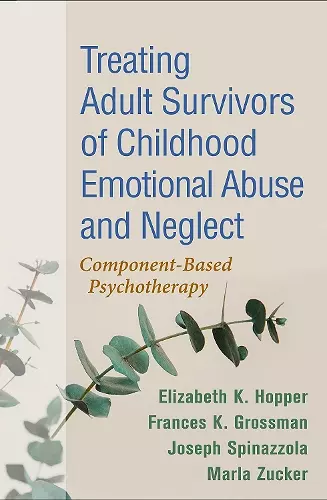Treating Adult Survivors of Childhood Emotional Abuse and Neglect
Component-Based Psychotherapy
Elizabeth K Hopper author Frances K Grossman author Joseph Spinazzola author Marla Zucker author
Format:Paperback
Publisher:Guilford Publications
Published:8th Oct '21
Should be back in stock very soon

Grounded in 40 years of clinical practice and research, this book provides a systematic yet flexible evidence-informed framework for treating adult survivors of complex trauma, particularly those exposed to chronic emotional abuse or neglect. Component-based psychotherapy (CBP) addresses four primary treatment components that can be tailored to each client's unique needs--relationship, regulation, dissociative parts, and narrative. Vivid extended case examples illustrate CBP intervention strategies and bring to life both the client's and therapist's internal experiences. The appendix features a reproducible multipage clinician self-assessment tool that can be downloaded and printed in a convenient 8 1/2" x 11" size.
See also Treating Traumatic Stress in Children and Adolescents, Second Edition, by Margaret E. Blaustein and Kristine M. Kinniburgh, which presents a complementary approach also developed at The Trauma Center at Justice Resource Institute.
"[CBP] is the latest of the longer-term treatment models and is notable for its sophistication and its flexible approach….It is a most welcome addition to the treatment literature for complex trauma, specifically as it addresses what has previously been an often underidentified component: the insidious and damaging effects of emotional abuse in childhood."--from the Introduction by Christine A. Courtois, PhD, ABPP, private practice (retired), Washington, DC; consultant and trainer, trauma psychology and treatment, Bethany Beach, Delaware
"This excellent book is pivotal in helping therapists reach out to their traumatized clients’ profound sense of annihilation and facilitate healing from emotional abuse and neglect. The authors present a superb account of their treatment model, which masterfully integrates the key components of truly helpful psychotherapy. Reading the appealing, illuminating clinical examples is a great privilege. This volume is a 'must read' for novice and experienced therapists alike, as well as students."--Onno van der Hart, PhD, Department of Clinical and Health Psychology (Emeritus), Utrecht University, The Netherlands
"CBP brings both wisdom and compassion to the challenge of working therapeutically when on the very edge of--and at times, thrown into--the abyss of dysregulation and dissociation that is complex trauma. The core principles and case studies reflect a deep understanding of the adult survivor’s experience as well as the importance of therapist self-awareness and self-reflection. This book's exploration of the therapeutic process is a valuable counterbalance (and complement) to manualized approaches to complex trauma therapy."--Julian D. Ford, PhD, ABPP, Department of Psychiatry, University of Connecticut Health Center
"The authors have written a tightly reasoned and empathic book on the psychodynamic treatment of complex trauma. It is especially focused on the therapeutic relationship, the clinician's and client’s internal experience, the role of dissociative 'parts,' and mind–body theories. Although this book diverges to some extent from my own perspective, it offers a balancing force in the face of more manualized, shorter-term models. I salute it for its intelligence and clinical wisdom, and recommend it as a thought-provoking and valuable addition to our current approaches."--John Briere, PhD, Department of Psychiatry and Behavioral Sciences (Emeritus), Keck School of Medicine, University of Southern California
"This book offers a very fine overview of the process of individual therapy with survivors of trauma--although, truth be told, many of its insights apply to therapy with virtually all clients. It will be especially useful for early-career therapists who may not yet fully realize the complexity and importance of their relationship with the client. A major strength of this book is its ongoing exploration of the impact of various aspects of trauma (such as dysregulation) on the therapist and the therapist's responses."--Pamela C. Alexander, PhD, private practice, South Natick, Massachusetts -
ISBN: 9781462548507
Dimensions: unknown
Weight: 460g
296 pages